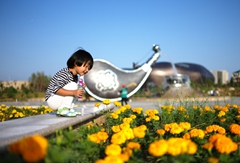Local company helps herdsmen fight sand and poverty
Updated: 2017-08-10 By Melanie Peters (Chinadaily)  Print
Print 



Babu Siren runs a thriving business that includes restaurants and dune buggy rides in Hanggin Banner of the Inner Mongolia autonomous region. He also farms sheep and licorice.
Life is a far cry from more than a decade ago when he struggled to support his family as a nomadic herder in the Kubuqi Desert, which was referred to as the "sea of death" because of its harsh conditions and the poverty in which people around it lived. The sand dunes had swallowed the grasslands.
And, sandstorms from there even polluted Beijing, which is 1,200 kilometers away.
Babu Siren, who is from the Mongolian ethnic group, and a large number of other desert dwellers are now reaping the benefits from the work of local companies and communities.
One example is Ordos-based Elion Resource Group that has invested more than 30 billion yuan ($4.4 billion) in the past 30 years in a plan to tackle desertification and alleviate poverty.
Babu Siren says during the peak season in summer, he hosts some 1,000 visitors a day, and makes 150,000 yuan a year.
"I no longer have to worry where my family's next meal is coming from."
Ahead of the 6th Kubuqi International Desert Forum, to be held from July 28 to 30, Elion says its model can be replicated in other parts of the world to fight drought and poverty.
The forum will be held in the desert and is seen as a major activity in international efforts on such front. This year's theme is "greening the Belt and Road, sharing desert eco-economy".
Around 300 government officials, entrepreneurs, economists, scientists and artists from different countries are expected to attend the forum, where Elion will also discuss how it helped save more than 6,000-square-km of land from desertification by growing herbs used in traditional Chinese medicine, building a solar energy unit and constructing 300 km of road in Hanggin.
The herb of choice here is licorice, which thrives in a tough environment. It has stimulated industries to improve the lives of the local people who earn an income through farming the plant and leasing land to grow it. These herbs also help to slow down desertification and gradually transform the desert areas into arable lands.
The "green wall" also acts like a barrier to counter the effects of sandstorms and helps to rehabilitate the land.
Wang Wenbiao, a senior economist and chairman of the board of the Elion Resources Group, was bestowed the honor of Global Dryland Champion by the United Nations in 2013 for the company's work in the desert. Through much adversity, Wang, who was born in Hanggin, realized his dream of defeating poverty and improving the lives of his community.
Wang describes his childhood memories of his hometown in a word "sand". He says changes in the area would not have been possible without government support and people's participation.
Monique Barbut, the executive secretary-general of the UN Convention to Combat Desertification, says the rehabilitation of the desert is a model for the global community, and it can balance the ecosystem and the economy.
According to a UN study, parts of Africa and Asia are at similar risk, as are parts of North America.
In June, Barbut spoke at a UN convention in Beijing, where the Joint Action Initiative to combat desertification, rehabilitate degraded land and mitigate the effects of drought was launched. The initiative aims to make China's ambitious rejuvenation of the old Silk Road environmentally sustainable.
The Belt and Road Initiative plans to boost economies from China, the Persian Gulf and the Mediterranean to parts of Africa, Asia and Europe. But these plans could prove futile as many of the countries involved in the initiative are affected by desertification and drought.
Barbut earlier called for the international community to come up with long-term solutions to "battle the ravages of drought and flood which are destroying communities". She warned that drought and floods devastate families and destabilize communities because they lead to mass migrations, leaving the vulnerable open to human rights abuses and long-term security threats.
She also believes China's experience in helping revive the health of deserts could benefit initiatives such as Africa's Great Green Wall, a project that aims to grow 8,000 km of trees and plants across the width of the continent to provide food and jobs.
The author is an online editor of South African newspaper Weekend Argus.





 Ordos Impression
Ordos Impression Ordos WeChat
Ordos WeChat Ordos Reported
Ordos Reported


